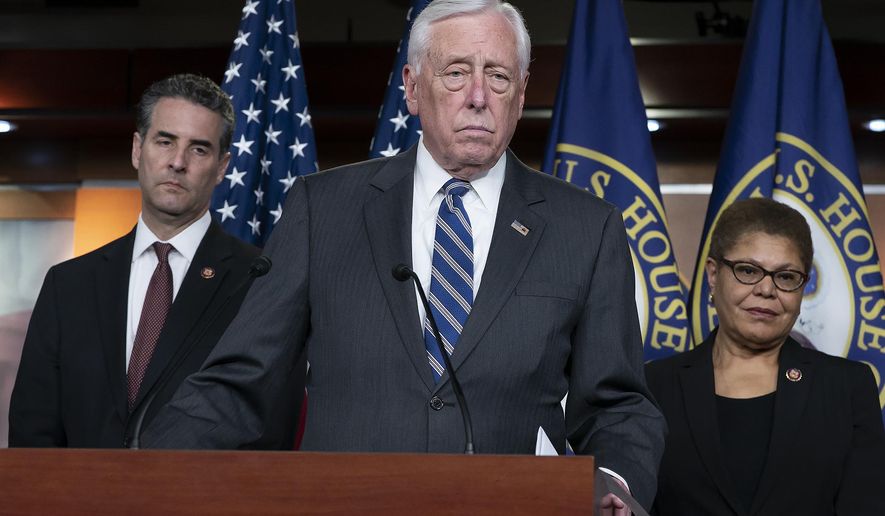Democrats plan to rush a suspension of the debt ceiling through the House this week by linking it to hurricane relief and aid to Afghan refugees, hoping to shame Republicans into providing bipartisan support.
House Majority Leader Steny H. Hoyer announced the vote in a letter Friday to Democratic lawmakers. He argued the debt limit suspension was essential to avoid a U.S. credit default in which the government can’t pay all its bills.
Mr. Hoyer, Maryland Democrat, vowed that Congress will “ensure that America pays its bills on time.”
The debt ceiling suspension will be considered alongside a stopgap funding measure to keep the federal government running past Sept. 30, when Congress will miss the deadline to pass annual spending.
Packaging the debt limit with humanitarian efforts is intended to lure Republicans into backing the debt suspension.
Republicans, who have balked at helping Democrats raise the debt limit, are arguing the move amounts to extortion. They say if Democrats are content to pass President Biden’s $3.5 trillion expansion of the federal safety net in party-line votes, they also handle the debt limit alone.
Meanwhile, infighting among congressional Democrats threatens the $3.5 trillion bill that includes a wish list of liberal priorities including new education and health care benefits, amnesty to immigrants who are in the U.S. illegally and climate change initiatives.
Democrats say the Republican stance on the debt limit is reckless, arguing that current U.S. debts were accumulated under prior administrations, including that of former President Donald Trump.
“President Trump added nearly $8 trillion to the national debt. If the U.S. defaults, it will harm every single American,” said Senate Majority Leader Charles E. Schumer, a New York Democrat. “We will work to raise the debt ceiling and avoid causing irreparable economic harm.”
Treasury Secretary Janet Yellen has warned that Congress must raise the debt ceiling by mid-October to prevent a default on debts.
“We have learned from past debt limit impasses that waiting until the last minute to suspend or increase the debt limit can cause serious harm to business and consumer confidence, raise short-term borrowing costs for taxpayers, and negatively impact the credit rating of the United States,” Ms. Yellen wrote in a letter to congressional leaders earlier this week.
Republicans dispute the attempts by Democratic leaders to blame Mr. Trump for the current fiscal cliff. They point out that the most recent debt suspension that Democrats agreed to in 2019 and which expired in August, covered the borrowing that had been accumulated under the last administration.
“This is a discussion about the future. This isn’t the last four years when we were reaching bipartisan agreement[s], bipartisan appropriations, and bipartisan COVID bills,” said Senate Minority Leader Mitch McConnell, Kentucky Republican.
He has pledged that Senate Republicans will not provide support for a debt-ceiling suspension or hike to overcome the 60-vote filibuster threshold.
With the Senate evenly split between the two parties, Democrats would then have to do it unilaterally using budget reconciliation. Reconciliation, which Democrats are using to pass Mr. Biden’s $3.5 trillion social welfare package, allows some spending and tax measures to avoid pass with a simple majority of 51 votes.
“Democrats have made a different choice, they want to make policy all by themselves. So they can come up with the financing on their own as well,” said Mr. McConnell.
Adding emphasis to the GOP’s position is Republican Sen. Ted Cruz of Texas who is threatening to filibuster any debt-ceiling measure that requires Republican support.
“They want to bankrupt the country without taking responsibility for the trillions in debt they’re trying to incur,” said Mr. Cruz. “I’m committed to doing everything I can to rein in their egregious spending.”
With both sides digging in, Mr. Schumer has begun warning lawmakers and aides alike to expect more than a few late nights as Congress approaches the government funding deadline.
• Haris Alic can be reached at halic@washingtontimes.com.




Please read our comment policy before commenting.